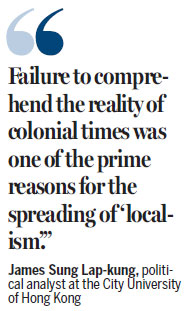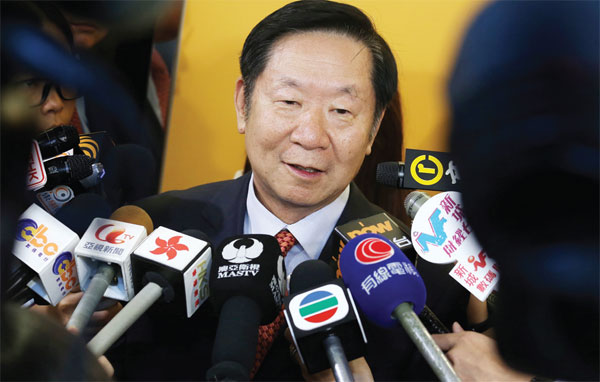'National identity is the key to decolonization'
Updated: 2015-09-22 07:41
By Shadow Li in Hong Kong(HK Edition)
|
|||||||||
|
Chen Zuo'er, former deputy director of the Hong Kong and Macao Affairs Office of the State Council, said Hong Kong's failure to implement a process of decolonization has caused problems. Parker Zheng / China Daily |
Political scientists agree that too many people remain stuck in HK's colonial past
The key element of "decolonization" is to develop a concept of national identity, veteran political scientists said on Monday.
They were commenting on recent remarks by a former central government official.
Over the weekend, a statement by Chen Zuo'er, former deputy director of the Hong Kong and Macao Affairs Office of the State Council, provoked heated debate in the city.
Chen said at a seminar on Sunday that Hong Kong had not done enough in terms of decolonization since the handover. Moreover, the city had developed a phenomenon of "de-sinofication", he added.
Lau Siu-kai, vice-president of Chinese Association of Hong Kong and Macao Studies, said he shared Chen's concerns about the SAR's failure to achieve decolonization.
After the handover, Hong Kong residents' identity changed from colonial subjects to Chinese citizens. However, the city's legal system and even some public policies remained the same, Lau explained.
Hong Kong has also witnessed the emergence of anti-mainland tourist actions. Protesters had also waved the colonial flag and trespassed into the People's Liberation Army barracks in Central. These and other disrespectful acts showed that the concept of a nation had yet to be established, Lau said.
City University of Hong Kong political analyst James Sung Lap-kung agreed. He said the shadow of Hong Kong's colonial past still hung over the city in some areas - especially in regard to education.
Protesters who waved the colonial flag wrongly believed that Hong Kong people were happier during colonial times. But this was a mistaken belief due to insufficient knowledge of history, Sung contended.
But the government's attempt to deal with this problem failed in 2012 when the national education curriculum was shelved, he noted.

Failure to comprehend the reality of colonial times was one of the prime reasons for the spreading of "localism", Sung said.
The central government's top envoy in the city, Zhang Xiaoming, earlier also stressed the Chief Executive's unique status in leading the SAR.
James Sung said these comments aimed to encourage a discussion during the post-"Occupy Central" era on national identity.
Lau Siu-kai believes "One Country, Two Systems" has now reached a critical point. If things do not change in future, the situation might eventually get out of control.
The prerequisite of "One Country, Two Systems" is the recognition of national identity and developing the concept of a nation. Without this, the mechanism will not work, Lau warned.
Only when Hong Kong people have a sense of nationhood, can decolonization or "One Country, Two Systems" be called a success, Lau explained.
"One Country, Two Systems", enshrined in the Basic Law, ensures that the social system and way of life in Hong Kong will remain unchanged for 50 years. This has been criticized by the opposition and "nativists" for not allowing more change to occur.
But Lau said this really showed that the central government was committed to maintaining social stability in Hong Kong and ensuring the best interests of its people.
stushadow@chinadailyhk.com
(HK Edition 09/22/2015 page6)
